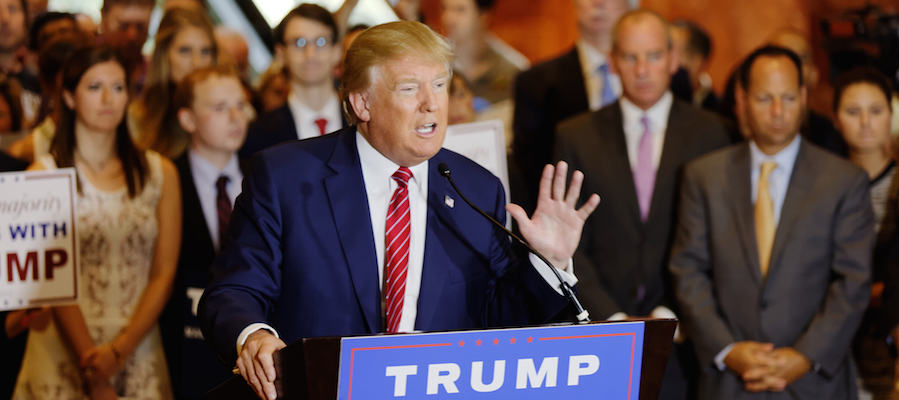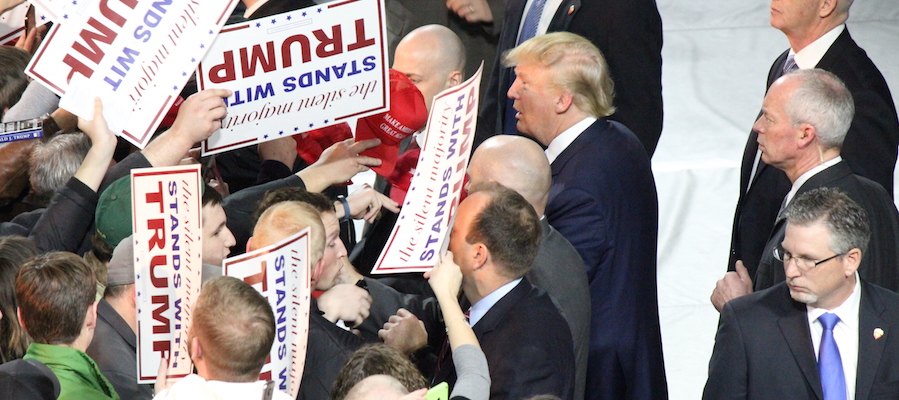The US election results: Brief thoughts on the unthinkable

Having watched the US electoral horror show unfolding over several months, I’m trying to stand back from the emotional impact of the outcome, to think of some of the themes for progressive debate and research in politics and communication. What understandings are relevant to the political action that our collective survival now necessitates?
First, we must ask: How did we get to this point of narrowing the political options to two dismal alternatives – neoliberal globalization, and various forms of ethnic or religious nationalism (with the “structure of feeling”, if not the exact policies, of fascism)?
Not that the two are necessarily antagonistic; as economist Samir Amin once described, culturalism and imperialism are complementary, and ‘the markets’ don’t necessarily mind fascism. Indeed, nationalism, the glorification of military power, and the assault on labour and human rights can serve market interests—especially sectors like ‘defence’ and fossil energy production—quite well.
If we are to rebuild an inclusive progressive alternative, we need to understand the various historical factors—from the deeply-rooted racism that defined much of the election, to the hollowing out of social democracy in the West, to US support for Islamicism as a way to undercut socialist and secular nationalism in the Middle East—that have forced progressives to pin their hopes on a problematic Democrat candidate.
Finding bridges between the economically and culturally marginalized seems essential to reinvigorating progressive and pro-environmental politics.
We must also review our understandings of fascism, and anti-fascist resistance. Studying theories of fascism in grad school, way back in the day, I thought it was of mainly historical interest. Little did we know then that we would need such historical and theoretical knowledge now.
We must take class into consideration, both in theory and in practice Pundits and pollsters prefer to speak of college vs. non-college-educated voters, as a surrogate for class; but meanwhile, for several decades, the Right has been colonizing real working-class grievances and sensibilities, going back to ..say… Pat Buchanan (candidate and Nixon speechwriter in the 1970s) and carried through by the likes of Rush Limbaugh, hate radio, Fox News, etc.
Finding bridges between the economically and culturally marginalized seems essential to reinvigorating progressive and pro-environmental politics.
Similarly, the Right has re-articulated democracy as populism and opposition to ‘the elites’ (defined in political and cultural terms rather than corporate/economic). Some of Donald Trump’s offhand (and doubtless self-serving) rhetoric parallel longstanding critiques made by the Left— for example, critiques of media mega-mergers as dangerous to democracy, or opposition to ‘global financial elites’—and it’s unsettling to see them harnessed to a rather less progressive politics.
At the same time, obviously a broader understanding of the dynamics and complexity of racialized politics is needed. One of the pollsters’ and media pundits’ frequent blind spots was to treat Latinos/Latinas and African-Americans as nearly monolithic. Trump could not have won without some degree of support from them, especially the former. Why?
News patterns have for years cultivated a disproportionate popular fear of crime and terrorism, and amongst political and economic elites, an indifference to growing inequality and economic insecurity.
So far as I can gather as a white guy up in Canada, factors include the diversity of Hispanic communities’ class and history, the possibility of psychological identification by some with the dominant group, racially targeted voter suppression in some states, and the lack of enthusiasm for a Democratic party that had taken minorities for granted. A similar reflection on why millions of white women would vote for such an obvious misogynist also is in order.
Then, of course, there’s the question of the roles of media. Unlike the UK, where the press was divided on Brexit, the US press overwhelmingly endorsed Clinton editorially (57 to 2, according to one report I saw). But so what?
In addition to his real estate empire, Trump was a creation of the media – a reality TV star who got billions of dollars of free press and airtime. As well, news patterns have for years cultivated a disproportionate popular fear of crime and terrorism, and amongst political and economic elites, an indifference to growing inequality and economic insecurity.
The election revealed the isolation of the media from rural, religious and working-class populations. Genuine media democratization has to be part of democratic renewal. (A plug: don’t miss the workshops, discussions, and other events of Media Democracy Days in Vancouver on November 19).
How the light gets in
Back in October—it seems a year ago—the editors of Monthly Review offered this trenchant summary:
…It is hard to look at this presidential race without recognizing that the ruling class of the United States is losing both its confidence and mental balance. Although still the hegemonic power, the United States now rules over a declining empire – one characterized by open racism, naked imperialism, permanent war, state terrorism, economic stagnation, widening inequality, accelerating climate change, declining education and public discourse, and collapsing health systems. Even the stabilizing and legitimating functions of its electoral exercises are increasingly less and less effective. All of this means that the formation of a truly revolutionary response to today’s crisis of capitalism is needed more than ever – for the sake of the ‘wretched of the earth’ and future generations.
Can those of us in current generations, and who are not yet so wretched, find some grains of hope? Well, yes. As the much-missed Leonard Cohen put it, “There is a crack in everything, that is how the light gets in.”
You’ve probably already seen the graphic map showing that if it were up to 18-34 year old voters, Trump would have won only about 6 of 50 states, while demographic trends are against the old white guys who disproportionately elected him.
In the bastion of global capitalism, self-declared socialist Bernie Sanders racked up 16 million votes during the primaries. And don’t forget, Trump actually got fewer votes than his main rival. But Clinton’s professionalized, well-financed election campaign nevertheless lost to the Trumpites, who considered themselves a grassroots social movement.
Not all movements are progressive, obviously, but it does show that the biggest war chest doesn’t always win, and that political boldness can pay off when it resonates with, and can articulate, popular hopes, concerns and anger. Something to keep in mind during the inevitable and necessary struggles to come.
Topics: Democracy, Election commentary



